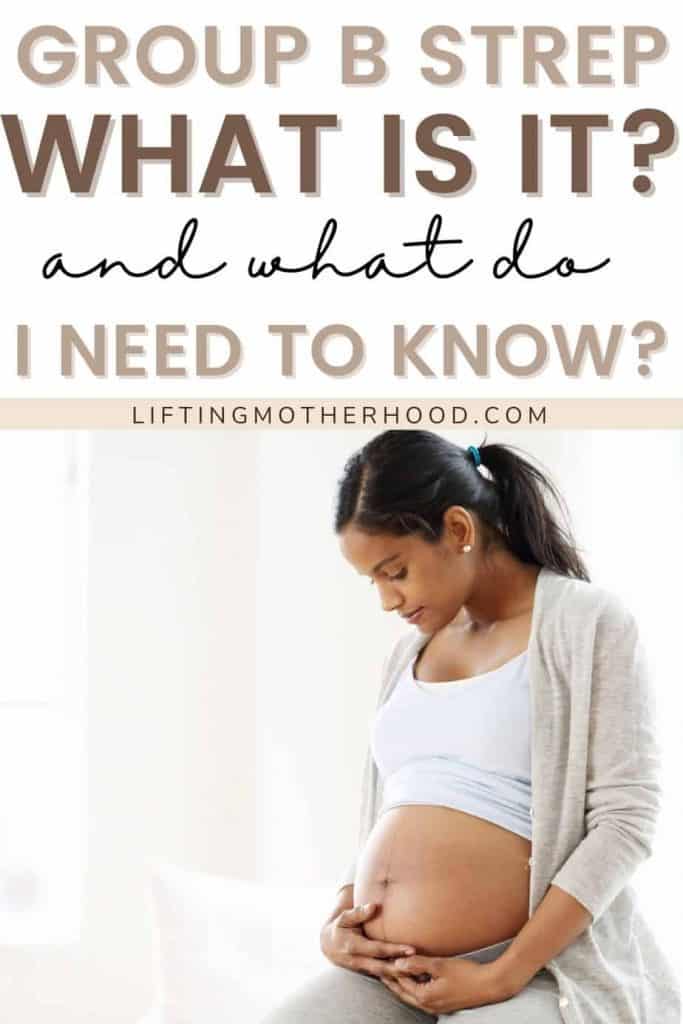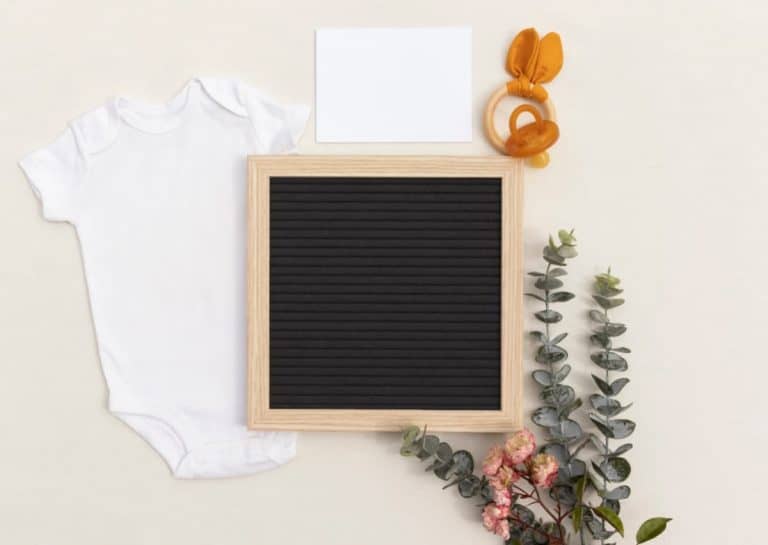Every Question You Might Have About Group B Strep During Pregnancy Answered By A GBS Positive Mom
This post may contain affiliate links, which means I’ll receive a commission if you purchase through my links, at no extra cost to you. Please read full disclosure for more information.
You might’ve heard of group b strep during pregnancy or GBS for short. Or maybe you never even heard of it until your OBGYN notified you that you tested positive for GBS during a routine test around 36 to 37 weeks of pregnancy.
Group B strep or GBS is short for group b streptococcus which is a gram-positive streptococcal bacteria also known as Streptococcus agalactiae. It’s a mouthful which is why we’ll stick with group b, group b strep, or GBS.
Before you get confused with group b streptococcus with strep throat- let me clear it up for you. Group a (a as in apple) streptococcus causes strep throat and the bacteria primarily affects the skin and throat. Group b (b as in banana) streptococcus (GBS) are bacteria found normally in the intestine, vagina, and rectum in about 25% of all healthy pregnant women.
Another important fact to know about GBS is that it is NOT a sexually transmitted infection (STI). When pregnant women find out that they tested positive for GBS they automatically freak out thinking it’s some sort of sexually transmitted disease.
This post will go over frequently asked questions about group b strep in pregnancy.

What is group b in pregnancy?
Group b streptococcus (GBS) is a bacteria that normal, healthy pregnant women carry in their bodies. It is not a sexually transmitted infection and is not the same bacteria that causes strep throat which is called group a streptococcus.
Being a carrier of GBS does not make you any less healthy than the person next to you that is not a carrier of group b strep.
How and when do you get tested for group b?
Not everyone is a carrier of group b strep. You’ll most likely be given a urine test early in the pregnancy to make sure you don’t have a urinary tract infection or any traces of group b streptococcus bacteria. Then, later around 36 to 37 weeks of pregnancy, a routine culture testing involving the swabbing of the vagina or rectum is tested for group b.
The test will then be sent to the laboratory and your results should be in between 1 to 3 days.
What happens if you test positive for group b strep?
If you test positive for group b strep during pregnancy, then you’ll be given intravenous (IV) antibiotics during labor to reduce the risk of passing strep b to your newborn baby.
I was given two bags of antibiotics. One at the very beginning of going into labor and the second one after they broke my water.
What’s the treatment for group b strep during pregnancy?
The treatment of choice for group b strep is penicillin. However, if you’re allergic to penicillin, be sure to notify your doctor. You’ll most likely receive other related drugs like cefazolin or clindamycin as an alternative.
How does a pregnant woman get group b strep?
Group b strep isn’t spread through food or water and how the bacteria is spread to anyone other than newborns isn’t exactly known. This is something I tried to research after I found out I tested positive for GBS.
Can my baby get strep b if I have a c-section?
For a planned c-section you’re most likely not going to need the IV penicillin if you test positive for group b strep. But, it’s still important to get tested for GBS just in case you go into labor (your water breaking) prior to your scheduled c-section.
Group b streptococcus is spread to the baby during vaginal birth. And when the mom’s water breaks- the baby is vulnerable to infection. That’s why you won’t necessarily need antibiotics if you have a scheduled c-section.
For me- I initially went into labor thinking I would have a vaginal birth. That’s why I was given two bags of antibiotics during the duration of my labor. However, I ended up having an unexpected c-section.
Related Posts
What Is A Let-Down Reflex During Breastfeeding And Other Breastfeeding Terms To Know
The Truth About Being A First Time Mother
What Is The Midwives Brew And Can You Use Midwives Brew To Induce Labor
What happens if I give my baby group b?
It’s actually not as common as you may think it is for a baby to get GBS. But when it does happen, it can be very serious. And babies who get GBS may have early-onset or late-onset disease.
Early-onset infection develops within the first week of the baby’s life. Babies will show symptoms in the first 24 hours. Late-onset infections develop weeks to months after birth.
Some signs and symptoms of group b strep include:
- Fever
- Feeding problems
- Breathing problems
- Sluggishness and a lack of energy (lethargy)
- Irritability or fussiness
- Jaundice
Group b strep can cause life-threatening complications in a newborn baby such as pneumonia, inflammation in the brain and spinal cord (meningitis), or infection in the bloodstream.
The treatment for group b strep in babies is IV antibiotics. And most babies treated with GBS do fine.
Can group b strep affect baby in the womb?
Group b strep is passed to the baby at the time of vaginal delivery. Babies aren’t affected by a mom who is a carrier of GBS while in their womb.
What are group b strep symptoms during pregnancy?
Most pregnant women who carry the group b strep bacteria don’t have symptoms of it and aren’t affected by the bacteria. But there have been cases where it’s shown to give women more urinary tract infections (UTI).
Personally, I was a carrier of GBS and it felt like I was being treated with antibiotics all throughout my pregnancy. I had UTI multiple times throughout all three trimesters of my pregnancy. And I’ve had a yeast infection a couple of times due to the antibiotics.
Monistat was my best friend during each yeast infection episode. And this 7-day kit is the one I used. I don’t recommend the 1-day maximum strength because your lady part is going to be on fire.
How do you prevent group b infections?
The best measure of prevention is routine screening during pregnancy. And the treatment of antibiotics to decrease the risk of GBS transmission to newborn babies.
GBS Takeaway
Group b strep or commonly called GBS is not a sexually transmitted disease and it is NOT the same as strep throat. And not everyone is a carrier of this bacteria. Group b strep bacteria live in the gastrointestinal and genital tracts.
You can spread the GBS to your newborn baby through vaginal birth. During your 36 to 37 weeks of pregnancy, you’ll get routine culture testing to test for GBS in your system. The testing involves swabbing of your vagina and rectum and will be sent to labs for results.
Even if you have a scheduled c-section, it’s still important to get the GBS test done. Your water might break before the scheduled c-section putting you in active labor which means your baby will be vulnerable to infection.
If you do get tested positive- you’ll be given IV antibiotics. And if you test negative- you don’t have anything to worry about.
I hope these questions you may have had about group b strep during pregnancy have been answered to your comfort!! Thanks for reading!








This was very informative. I recall something about GBS when I was pregnant, but the info went one ears in and one ears out since I didn’t have it, lol. Great info for pregnant moms.
http://www.shandeanreid.com